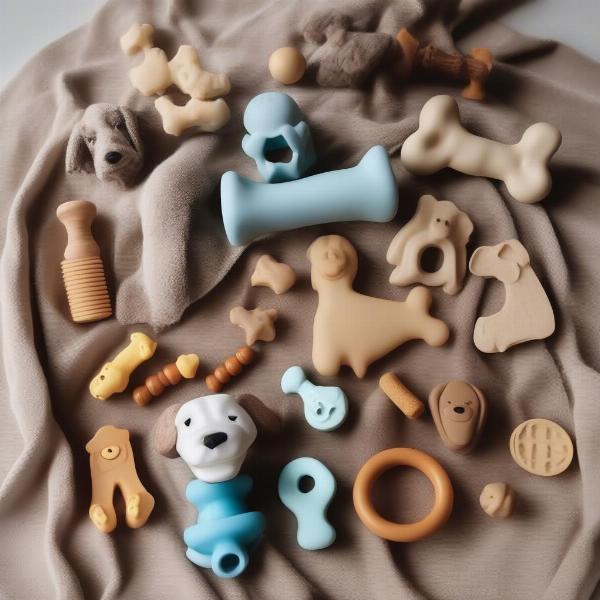Meat bones can be a delicious and nutritious treat for your dog, providing mental stimulation and helping to keep their teeth clean. However, it’s crucial to understand the potential risks and choose appropriate bones to ensure your dog’s safety and well-being. This article will guide you through everything you need to know about giving meat bones to your dog.
Understanding the Benefits and Risks of Meat Bones for Dogs
Giving your dog a meaty bone can be a rewarding experience for both of you. Chewing on bones provides valuable mental stimulation, helping to alleviate boredom and reduce anxiety. The gnawing action also helps scrape away plaque and tartar, promoting dental health. Bones are a natural source of essential minerals like calcium and phosphorus. However, not all bones are created equal, and some can pose serious health risks. Cooked bones, especially, become brittle and can splinter, causing choking hazards, internal injuries, or blockages in the digestive tract.
Choosing the Right Meat Bones for Your Dog
Selecting the right type of bone is paramount to your dog’s safety. Always opt for raw bones over cooked bones. Raw bones are more flexible and less likely to splinter. Suitable raw bones include beef, lamb, pork, and poultry bones. Avoid weight-bearing bones from large animals like cows and bison, as these can be too hard and damage your dog’s teeth. Choose bones that are appropriately sized for your dog. A bone should be large enough that your dog can’t swallow it whole but small enough for them to comfortably chew.
Safe Handling and Supervision
Even with appropriate bones, supervision is key. Never leave your dog unattended with a bone. Monitor their chewing and remove the bone if it becomes too small or splintered. Discard any bone that has been chewed down to a size that could pose a choking hazard. After a few days, discard the bone to prevent bacterial growth.
Alternatives to Meat Bones
If you are uncomfortable giving your dog meat bones, several safe alternatives exist. These include commercially available chew toys made from durable rubber or nylon. Dental chews specifically designed to promote dental health are also a good option. Always choose chews that are appropriately sized and durable enough to withstand your dog’s chewing habits.
 Dog Playing with Chew Toys
Dog Playing with Chew Toys
Recognizing Potential Problems
While rare with appropriate raw bones and proper supervision, problems can still arise. Be aware of signs such as gagging, choking, vomiting, diarrhea, or bloody stool. If you notice any of these signs, contact your veterinarian immediately.
Conclusion
Meat bones can offer several benefits for dogs, including mental stimulation and dental health. However, careful selection, preparation, and supervision are essential for safe and enjoyable chewing. By following the guidelines outlined in this article, you can help your dog enjoy the benefits of meat bones while minimizing potential risks. Always consult with your veterinarian if you have any concerns about your dog’s diet or chewing habits.
FAQ
- Are cooked bones safe for dogs? No, cooked bones are dangerous for dogs as they can splinter and cause internal injuries.
- What type of raw bones are best for dogs? Raw beef, lamb, pork, or poultry bones are generally suitable. Avoid weight-bearing bones from large animals.
- How long can I leave a bone with my dog? Supervise your dog closely while they are chewing a bone and remove it when it becomes too small or splintered.
- What should I do if my dog swallows a bone splinter? Contact your veterinarian immediately.
- Are there alternatives to meat bones? Yes, there are many safe and durable chew toys available.
- Can puppies have meat bones? Yes, but ensure the bones are appropriately sized and supervise them closely.
- How often can I give my dog a meat bone? One to two times a week is usually sufficient.
Related Articles
- raw dog food for dogs with allergies
- frozen dog bones
- complete raw food for dogs
- rabbit food for dogs
ILM Dog is a leading international website dedicated to providing expert advice on dog care and nutrition. We cover a wide range of topics, from breed selection and health care to training, behavior, and nutrition, offering valuable resources for both new and experienced dog owners. We are passionate about helping dog owners provide the best possible care for their furry companions. For any inquiries, please contact us via email at [email protected] or phone at +44 20-3965-8624. Visit ILM Dog for more information and expert guidance on all aspects of dog care.